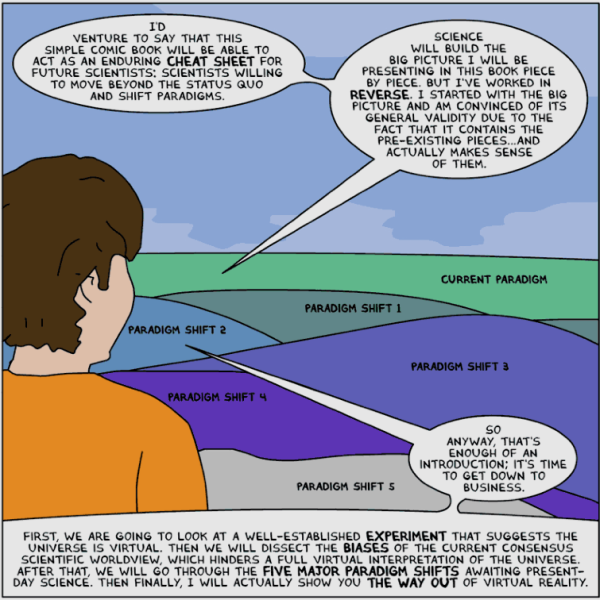Virtual Signaling
I saw it in the library--The Universe Is Virtual, a graphic book by Alexander Marchand. If this was true, it seemed worth knowing. Though, after perusing it, I fear Mr. Marchand falls short of the mark.
He spends an awful lot of time condemning modern science and philosophy for deluding themselves into thinking the world is objective. Just a note--if you want to make an argument, you might mention at the outset that people's dogmas get in the way, but there's no need to keep repeating this. It's not an argument, and after a while such name-calling gets tiresome.
Marchand starts out reviewing the basics (it has to be basic--this is an illustrated book of philosophy, not science) of quantum physics. In essence, once you get down to sub-atomic particles, things don't work as we're used to in the macro-world. Things seem to be digital as opposed to analog, and causality doesn't seem to work as we understand it.
A decent start, but at this point, Marchand doesn't argue for what he believes so much as go off on a flight of fancy. What he claims can't be disproved, I suppose, but that's not enough to put his case over.
I apologize if I simplify his heartfelt beliefs, but here goes.
First, as the title says, The Universe Is Virtual. It's also subjective, not objective. Thus, science, and the human race in general, needs to go through a number of paradigm shifts until we see things as they are.
The universe is data and probabilities, as you'd see in a video game--if you play a game with Super Mario, he has rules to follow, and where he goes and what exists in his world depends on what is done--there's a higher reality that exists and Mario, if he had such awareness, would understand that his world isn't all there is.
Because the universe is subjective, and its data only comes to life when dealt with by consciousness (in the same way that a book is just marks on paper until someone brings it to life by reading it), that would mean a rock in a cave on Venus that no living thing has ever seen only exists as a probability until some mind comes into contact with it and interprets it. Reality is what has been recorded by minds--in fact, the more that gets recorded, the more everyone can agree on something and believe it's objective. This is why mystical or paranormal experiences can't be measured objectively--because they generally happen to one person at a time, and if enough people experience them, they go from paranormal to normal. (Pretty convenient. It makes it impossible to check out mystical claims. Though it seems to me if people say they have the ability to read minds, or tell the future, or levitate, or anything else that intrudes into the objective world, then we can actually measure and test it.)
The objective rules that science has discovered work as far as they go, but, just as Newtonian physics still works within the limits of Einsteinian physics, so must our present understanding give way to a bigger truth.
Mind is thus separate from the objective world, and can't be understood by the same rules. It's the way out of what could be compared to a great computer simulation. In this simulation, entropy is central, and it's also another word for fear. There's the past, present and future, and everything runs down eventually. Thus we fight off entropy as best we can, especially by virtual love, which is better than nothing, but is still a losing battle.
But consciousness doesn't die. Consciousness has been in all sorts of beings (thus so many constructs we believe in, such as sex, race, so on, are artificial and meaningless). Sometimes fragments of former consciousness still exists in a present being, and thus we have tales of reincarnation--which is a true phenomenon, but only a partial view of a bigger truth.
The bigger truth is that all is oneness, a mass consciousness. It's just this oneness has been divided, and digitalized, if you will, into our world--the world we understand (or think we do), with rules we live by. But also the one that blocks our consciousness from comprehending the truth.
Ultimately, what we need is quantum forgiveness, where we erase the digital world we live in and return to the oneness, which is true love--not virtual love, which is the best we can manage in this delusional world of ours.
This return to oneness, by the way, is inevitable, but can be sped up by greater understanding.
Marchand makes a feint toward science at the beginning of his book, but soon is arguing entirely by analogy and metaphor (and some claims of personal, mystical experience).
There are many who argue there is a separate realm. In fact, that's a widespread belief. Such arguments may be correct. Certainly much of the truth of the universe is hidden from us, and may some day be revealed.
But until that day, I'm afraid we'll just have to accept the limited objectivity that we can manage. If anyone has any other claims, assertion does not equal proof.



2 Comments:
Sounds like Transcendentalism with a computer overlay. The immortal "I" - I am only sure that I exist (I'm pretty sure Columbus guy exists, but I need more proof).
Really? It sounds as rational as any religious explanation I know of, and actually has more evidence.
Post a Comment
<< Home